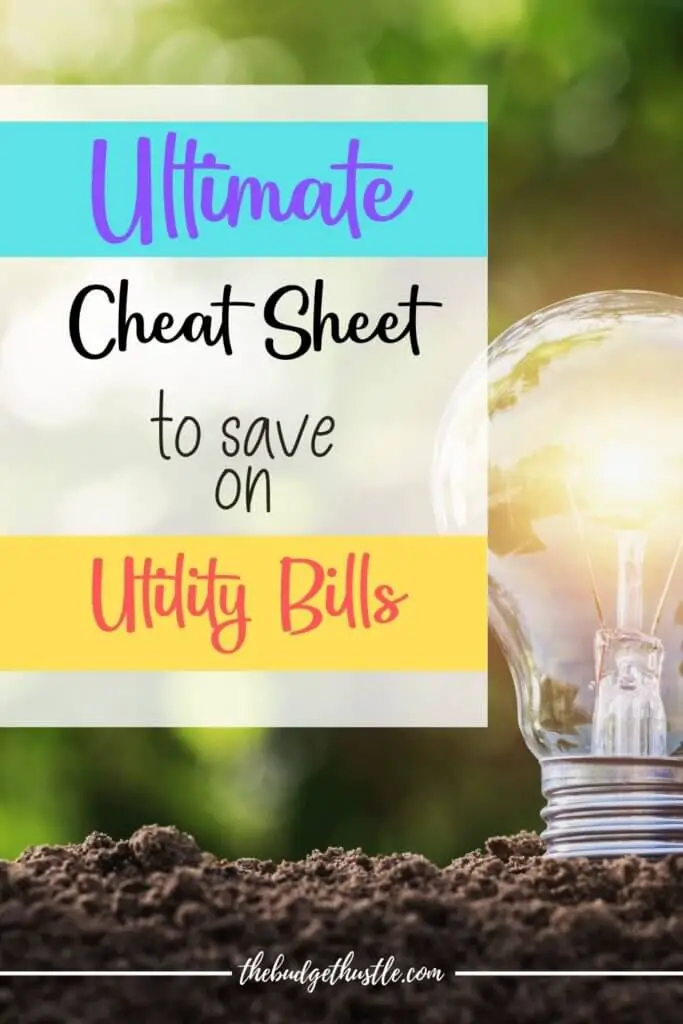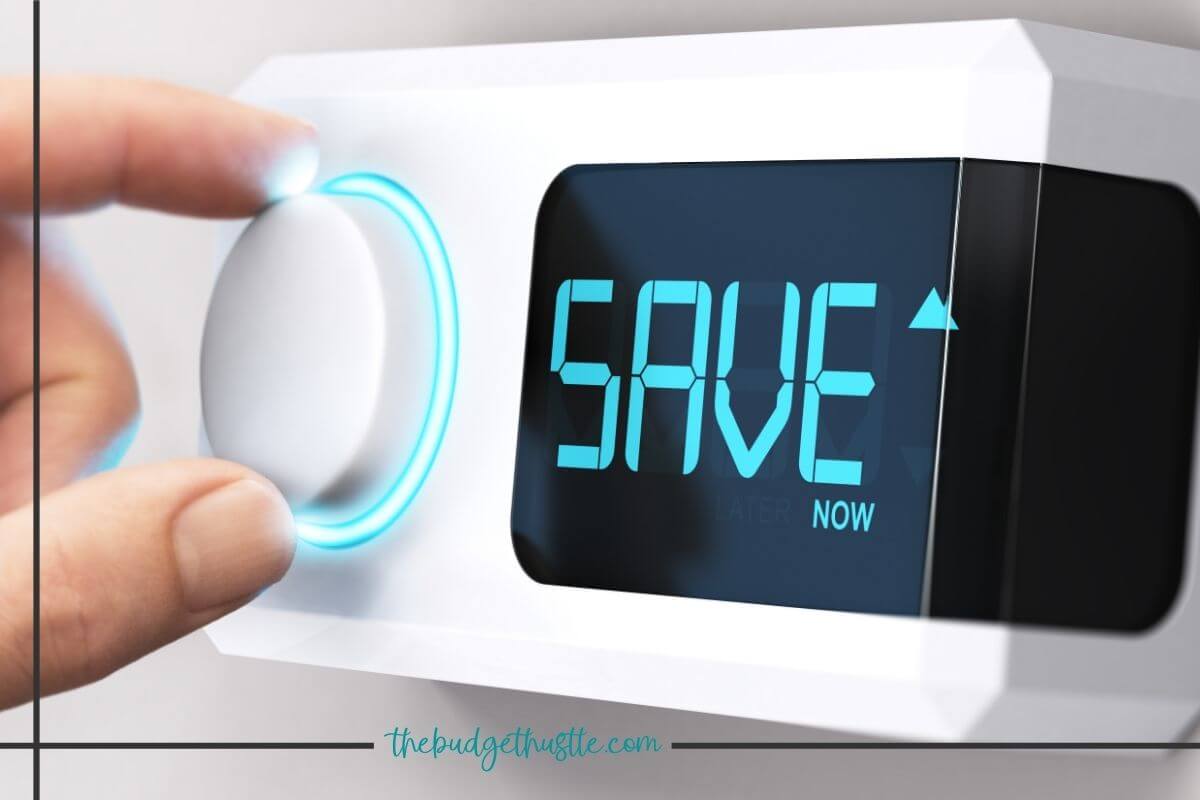This site contains affiliate links to products. We may receive a commission for purchases made through these links.
I love to save money, especially on things I can control like my utility bills. Energy is expensive and saving on it can have some real advantages. Simple adjustments can help save you thousands. Let me show you what we do at my house to cut costs.
Change the Light Bulbs
One of the biggest problems we have at my house is getting my kids to turn off the lights. It doesn’t matter how many times I say it, they still don’t do it. If this is a problem in your house, you can switch your bulbs to LED to help reduce the amount of electricity used.
Swapping out your light bulbs with LED bulbs can save you up to $100 a year.
You can also install dimmers to help reduce the amount of electricity you use. Dimmers let you adjust the brightness while also saving you money.
We also like to use natural light whenever it is possible. I’m actually doing that right now while writing this post. Where my desk is gets afternoon sun so I use the natural light in the morning (in the summertime). During the hot days of the year, I keep the hot sun out so that my rooms stay cooler.
In the winter, I keep all the windows open so the sun heats the house up.
Window Coverings
This brings me to my next tip. Like I said before, I let the sun heat up my house in the winter but in the summer I use darkening blinds and curtains to keep the heat out.
I have also tinted my windows to keep the sun out. I have two giant windows with a half circle above. This part of the house gets morning sun, so in the summer I keep it covered so that the heat of the sun stays out.
Caulk the Windows
Applying caulk around windows stops unwanted air leaks. You can also add weatherstripping around doors or windows to stop heat loss and air leaks. These leaks can cost you a lot of money in energy. Go to Energy.gov to see step by step instructions on how to do this.
Programmable Thermostat
Switching to a programable thermostat can help because you can adjust it to your schedule. Turning the thermostat up or down a few degrees while you are gone means less energy use.
A programmable thermostat can save you $180 per year.
Keep Air Filters Changed
This is so important but yet we all forget to do it. Keeping your air filters changed helps your heating and cooling system run efficiently. It also helps keep everything cleaner which makes it run better.
Below I have a link to a company that will deliver them to you or an amazon link to order filters (both are affiliate links where I receive a small commission at no cost to you)

Check Ducts for Leaks
You can lose so much energy through leaky ducts. Checking your duct work for leaks, holes and clogs will make it run more efficiently. You can always call a professional to check your system and clean it to keep it running at max efficiency.
Adjust Hot Water Heater
Most water heaters are set to 140 degrees. If you reduce it to 120 degrees you can lower your costs by 10%. If you go out of town, you can set it to the lowest setting while you are away because there is no reason for it to keep the water hot while you aren’t there.
Insulating your water heater can also save energy because it will keep the water hot and reduce the energy it takes to maintain the temperature.
Keep Oven Closed
Keeping the oven closed while you are cooking can help it retain the heat while keeping the extra heat out of your house. Yes, I mean you need to resist the urge to open it while cooking…I know you want to look at those biscuits but you are letting the heat out. In the summer, this can make your air conditioner run.
You can also cook outside in the summer to keep the extra heat out and cook inside in the winter to utilize the heat the oven produces.
You can use smaller appliances to cook with such as a toaster oven that uses less energy. I cook my kids totinos pizzas in the toaster oven because it uses less energy to cook.
I also turn off the burner right before I am finished cooking because the pan is already heated so it will continue to cook. An example of this is like when I cook eggs. Once the pan is heated, the eggs continue to cook even after I turn off the burner.

Unplug Electronics
Have you ever heard of phantom energy? This is the energy that is being pulled in by electronics that are plugged in but not in use. You can do this with things you don’t use often to keep them from using up energy.
Cell phone chargers are notorious for keeping the wattage going when not in use. I have stressed to my kids about unplugging the chargers when they are finished. We have a jar that houses the chargers so they are supposed to “return” them when they are done and this keeps them unplugged.
Use Smart plugs or Strips
Power strips and smart plugs can help control the amount of wattage that your electronics use.
They manage the power supply for you by preventing the electronics from drawing electricity when they are not in use. We have our entertainment center plugged in to one of these.
Make your Appliances Smarter
You can make your appliances work smarter for you by controlling how they operate.
Dishwasher:
Skip the pre-rinse and let your dishwasher do the work. Most dishwashers now a days are designed so that you don’t have to pre-wash your dishes. Pre-washing uses hot water unnecessarily because the dishwasher is fixing to repeat the job.
Let your dishes air dry instead of using a heated dry. I know that the heated dry option is convenient but it can save you money by not using it.
Washer and Dryer:
Wash your clothes in cold water to help save energy. (unless you have a stubborn stain) 90% of a washer’s energy consumption is from heating the water.
Utilize an extra spin to keep your dry time down.
Clean your dryer to free it from lint and it will work better when the air flow is increased. We make sure to clean the lint trap after every load and we make it a habit so that it stays clean.
We also clean the dryer once a year (take it apart and deep clean it). I googled my dryer name and said “taking it apart” to find a youtube video with step by step instructions. There is literally a video for everything!
I once fixed my refrigerator by googling the problem and finding out there was a drain plug that needed cleaning with dawn dish soap. It was a simple fix and there was a video to show me how.
You can use a drying rack to reduce energy consumption. If you air dry your stuff, you don’t have to use the dryer, which saves you money.
We also use dryer balls instead of dryer sheets so that it reduces the time in the dryer. Dryer balls help to fluff laundry as it drys which reduces the time needed.
Refrigerator:
Adjust the temperature on the refrigerator to ideal which is 35-38 degrees on the fridge and 3-5 degrees in the freezer. If yours uses a scale system, set a thermometer in the fridge to find out the temperature and adjust it accordingly.
Make sure that your refrigerator isn’t located next to a heat producing appliance such as your stove or dishwasher.
Run your appliances after peak hours, most power companies charge more during peak hours.
Low Flow Fixtures
Using low flow fixtures can reduce the amount of water you use and could lower your water bill. It is also good for the environment. It can save you between 25-60 percent on water usage.
Taking shorter showers will help by reducing the amount of water used and the amount of heated water that is used. Reducing your shower time by 2 minutes can save you up to 5 gallons of water.
An efficient shower head can decrease your usage by 2500 gallons per year.
Ceiling Fan Directions
Did you know that there are correct directions that your ceiling fan should be spinning?
During the summer, your fan should be spinning in a counterclockwise direction to push the air down. This creates a wind-chill effect that makes you feel cooler.
Reversing the fan in the winter to a clockwise direction creates an updraft that will recirculate the heat back down. Be sure to keep it at a low speed so that it will force the warm air that has risen back down without cooling it off.
Extra Insulation
Insulation reduces the exchange of heat through a surface such as a wall or ceiling. If your house is insulated well, it can reduce the amount of energy needed for heating and cooling. A few years ago, we added some extra when we closed in our garage and it was worth every penny.
I noticed a decrease in my bill and also noticed the temperature inside my house was more comfortable.
Use Less Water to Flush
Reducing water waste in your toilet can save you money. Install toilets that use less water or fill a water bottle and put it in your tank to reduce the amount of water it uses to flush. It could potentially save you up to $50 per year.
My next set of advice is not for everyone but you can save water by reducing the number of times you flush. “If its yellow let it mellow”. I heard this phrase a thousand times growing up. If you use this method, be sure to leave the seat down (this is hard for my boys to do in my house, lol) They like to go outside anyway since we live in the country.
Solar Power
You don’t have to go completely solar but there are more affordable ways to utilize solar power in your home. We installed a solar-powered light that has motion sensors at our woodshed and we have an outdoor camera that is solar-powered as well.
Insulate Light Switches and Outlets
This is often overlooked but switches and outlets can be a source of air leaks. It is especially beneficial if they are on an exterior wall.
Be sure to get the specialized outlet and switch plate seals so you don’t have to worry with fire risks.
Negotiate
It never hurts to ask. Utility bills can be negotiable too. Many providers have rate reduction programs or rebates. You can also ask for a discount for setting up auto-pay.
When you get ready to negotiate, do your research. Keep the conversation open ended by asking “what can you do to help me lower my bill?” They are more likely to help you if you are being nice. Asking bluntly for a discount can often times get you a “no”.
Final Thoughts
For more household savings, try adjusting your budget or see ways to lower your grocery bill. I have lots of frugal living tips and ways to save money that you might not have considered before.
You can also follow me on Pinterest for lots more. Have a Fabulous Day!



